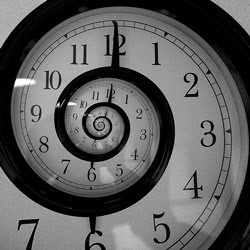What else is our life but a series of preludes to that unknown Hymn, the first and solemn note of which is intoned by Death?—Love is the glowing dawn of all existence; but what is the fate where the first delights of happiness are not interrupted by some storm, the mortal blast of which dissipates its fine illusions, the fatal lightning of which consumes its altar; and where is the cruelly wounded soul which, on issuing from one of these tempests, does not endeavour to rest his recollection in the calm serenity of life in the fields? Nevertheless man hardly gives himself up for long to the enjoyment of the beneficent stillness which at first he has shared in Nature’s bosom, and when “the trumpet sounds the alarm”, he hastens, to the dangerous post, whatever the war may be, which calls him to its ranks, in order at last to recover in the combat full consciousness of himself and entire possession of his energy.
– Franz Liszt, Les préludes
The consideration of time is of great importance when attempting to get to the essence of one’s phenomenological experience. Much of humanity’s current understanding of the nature of time has been arrived at through the science of physics, a subject on which I am not an authority and am therefore not going to pretend as if I am. With that said, I do have a basic understanding of Einstein’s theory of relativity and Heisenberg’s uncertainty principle, both of which are relevant to the topic at hand. I am convinced that the apparent linearity of time is merely an illusion created by human perception. The human experience is essentially the perception of events which occur between the time of an individual’s birth and death. We divide this time into years, months, weeks, days, hours, minutes, and seconds for the sake of convenience but these are only mental constructs and truthfully the experience between birth and death is but one continuous moment, a brief flash of light in eternity. When the body is sleeping or otherwise unconscious, the individual will either immediately experience an alternate reality such as a dream or there will simply be an absence of experience after which his consciousness will seamlessly resume upon awakening with nothing to indicate that there has been any sort of break or pause other than the passage of time which can only be discovered by looking at changes in the sky, a clock, or asking someone else. As a metaphorical analogy, imagine an individual’s life as a light that turns on at the moment of birth and turns off at the moment of death. It is surrounded on both sides by eternal darkness (or nothingness). Once the light is turned on at birth, it never once darkens or flickers or turns off until the moment of death. Consciousness is constant. As long as a body is alive it will never not be conscious as to be unconscious (such as in the state of dreamless sleep) is to have an absence of experience and obviously an absence of experience cannot be experienced. Like I stated above when considering dreamless sleep, an individual has the experience of getting into bed, becoming increasingly tired, and then his consciousness immediately resumes at the moment that he wakes up. There is no experience of a break in between and nothing to suggest such a break other than the passage of time which cannot be experienced when unconscious. I trust that at this point I have sufficiently demonstrated that an individual’s consciousness is constant between the moment of birth and the moment of death.
During the experience of life, the individual perceives time as being linear; one moment comes after another. I started reading philosophy books when I was 17. Now I am 26 and I am writing a philosophical essay, having been influenced by the numerous books I have read between then and now. To those in the future, however, every moment of my life, including the present in which I am typing these words, is in the past. In fact, the vast majority if not all of the people living on this planet in one hundred years will never know that the event in which I sat in this office and typed these words on this computer ever occurred. I myself may be forgotten entirely. This of course is not up to me. I am not one who deliberately endeavors to be remembered. I understand that if I am meant to be remembered then I will be and if not it is just as well. Every living being is essential to the unfolding of the divine plan. As is explicated in the theory of the “butterfly effect”: every minute event that occurs in this universe has a tremendous impact on the manner in which the future shall unfold. Certain prophets, teachers, artists, and thinkers such as Jesus, Plato, Leonardo Da Vinci, and Goethe as well as many others are still remembered long after their deaths not because of the magnificence of their individual identities but because they were divinely inspired and served as vessels for the deliverance of eternal metaphysical truths to humanity. One must remember that all of these men were shaped by the societies in which they lived and that this reinforces the truth of the importance of every living being and indeed every single minute detail of the universe. When living through a particular time, it can be difficult to “see the forest for the trees” as they say. The importance of certain persons and events is often not understood until many years after they have passed. Take for instance the number of artists whose work has only been recognized posthumously. With this in mind it is clear that one should not work or create for the purpose of one’s own glory or in pursuit of public adulation but rather give the glory to God and surrender to and align with the universal will. All is as it should be, for it cannot be otherwise.
I stated above that in the absence of invented measurements the life of a human being can be understood as one continuous moment. Following this train of thought, and keeping in mind that the linearity of time is merely a bias of human perception and has no objective truth, one could consider all events that have occurred since the beginning of the universe as well as those that still will occur before its end to be happening simultaneously as part of the same single moment. As I am typing these words on my computer in my office in the state of Michigan in the United States on the planet Earth on the date of January 1st, 2015, Aleister Crowley is being born in Britain in 1875, and Jesus is being crucified 2015 years ago, and a major war is being fought in a still uncertain future. Only within my subjective perception have past events “already happened” and future events “haven’t happened yet.” The Marquis de Sade is writing The 120 Days of Sodom in prison in 1785 and within his perception the act of writing that work is the immediate present. The soldiers fighting in the wars of the future experience the fighting as “happening now.” All events are inevitable. I am going to avoid the tendency of many contemporary mystics to speak as an authority on the subject of quantum physics considering that I (like the majority of such mystics) am decidedly not. However, I do know that a physicist named Heisenberg discovered the “uncertainty principle” and that its basic consequence is that we cannot predict the manner in which quantum systems will unfold. This by no means negates the truth of determinism, however. The uncertainty principle merely implies that the human mind cannot predict exactly the manner in which future events are determined, but determined they are nevertheless.



Pingback: Dreams and The Unconscious | Left Hand Rising